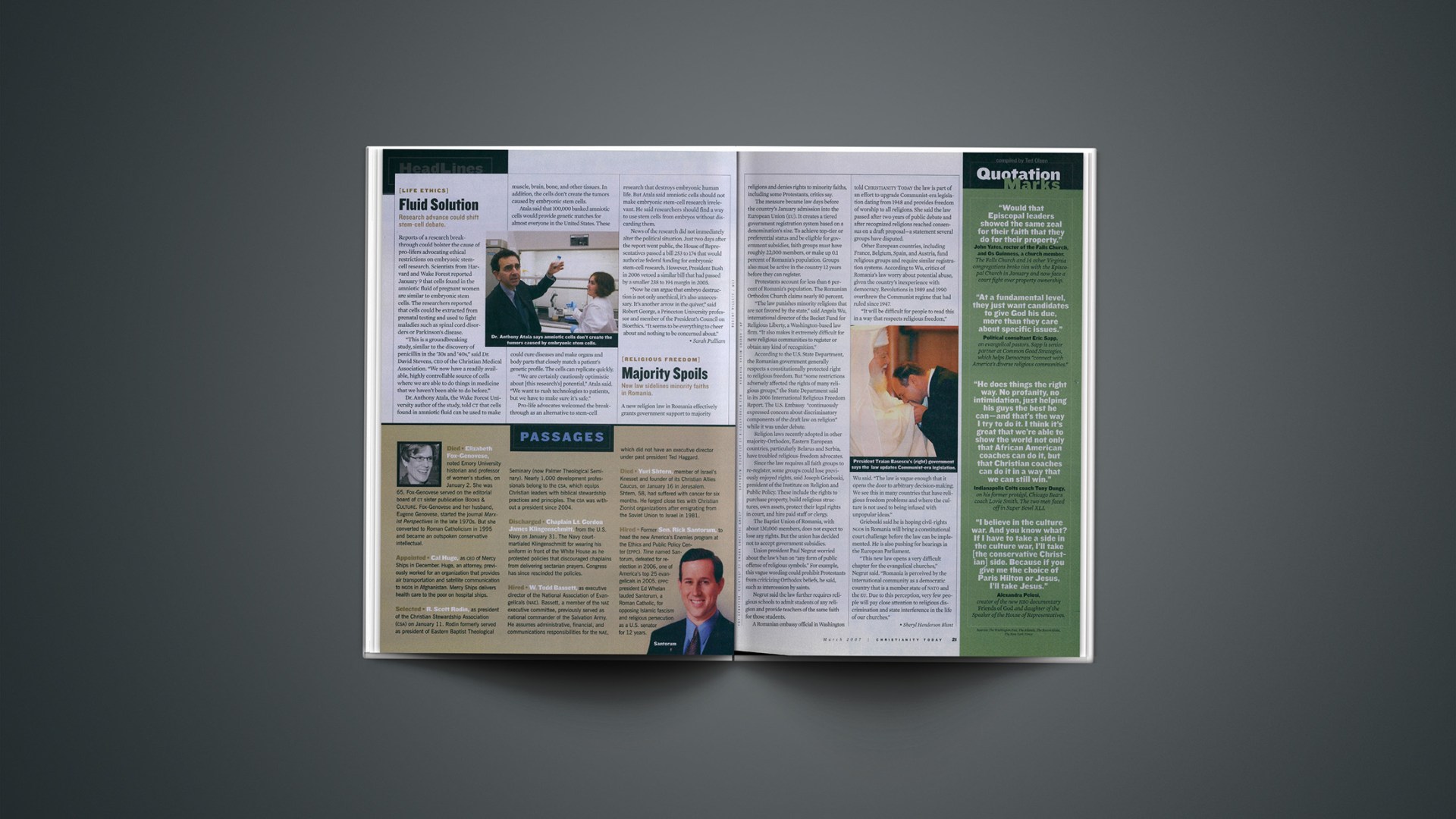A new religion law in Romania effectively grants government support to majority religions and denies rights to minority faiths, including some Protestants, critics say.
The measure became law days before the country’s January admission into the European Union (EU). It creates a tiered government registration system based on a denomination’s size. To achieve top-tier or preferential status and be eligible for government subsidies, faith groups must have roughly 22,000 members, or make up 0.1 percent of Romania’s population. Groups also must be active in the country 12 years before they can register.
Protestants account for less than 6 percent of Romania’s population. The Romanian Orthodox Church claims nearly 80 percent.
“The law punishes minority religions that are not favored by the state,” said Angela Wu, international director of the Becket Fund for Religious Liberty, a Washington-based law firm. “It also makes it extremely difficult for new religious communities to register or obtain any kind of recognition.”
According to the U.S. State Department, the Romanian government generally respects a constitutionally protected right to religious freedom. But “some restrictions adversely affected the rights of many religious groups,” the State Department said in its 2006 International Religious Freedom Report. The U.S. Embassy “continuously expressed concern about discriminatory components of the draft law on religion” while it was under debate.
Religion laws recently adopted in other majority-Orthodox, Eastern European countries, particularly Belarus and Serbia, have troubled religious-freedom advocates.
Since the law requires all faith groups to re-register, some groups could lose previously enjoyed rights, said Joseph Grieboski, president of the Institute on Religion and Public Policy. These include the rights to purchase property, build religious structures, own assets, protect their legal rights in court, and hire paid staff or clergy.
The Baptist Union of Romania, with about 130,000 members, does not expect to lose any rights. But the union has decided not to accept government subsidies.
Union president Paul Negrut worried about the law’s ban on “any form of public offense of religious symbols.” For example, this vague wording could prohibit Protestants from criticizing Orthodox beliefs, he said, such as intercession by saints.
Negrut said the law further requires religious schools to admit students of any religion and provide teachers of the same faith for those students.
A Romanian embassy official in Washington told Christianity Today the law is part of an effort to upgrade Communist-era legislation dating from 1948 and provides freedom of worship to all religions. She said the law passed after two years of public debate and after recognized religions reached consensus on a draft proposal—a statement several groups have disputed.
Other European countries, including France, Belgium, Spain, and Austria, fund religious groups and require similar registration systems. According to Wu, critics of Romania’s law worry about potential abuse, given the country’s inexperience with democracy. Revolutions in 1989 and 1990 overthrew the Communist regime that had ruled since 1947.
“It will be difficult for people to read this in a way that respects religious freedom,” Wu said. “The law is vague enough that it opens the door to arbitrary decision-making. We see this in many countries that have religious freedom problems and where the culture is not used to being infused with unpopular ideas.”
Grieboski said he is hoping civil-rights NGOs in Romania will bring a constitutional court challenge before the law can be implemented. He is also pushing for hearings in the European Parliament.
“This new law opens a very difficult chapter for the evangelical churches,” Negrut said. “Romania is perceived by the international community as a democratic country that is a member state of NATO and the EU. Due to this perception, very few people will pay close attention to religious discrimination and state interference in the life of our churches.”
Copyright © 2007 Christianity Today. Click for reprint information.
Related Elsewhere:
Other articles on Romania include.
Under Reconstruction | How Eastern Europe’s evangelicals are restoring the church’s vitality. (October 2005)
Churches Want to Drive a Stake in Transylvania’s Dracula Park | Tourist attraction gives a false image of the country and could fuel interest in the occult, Christian leaders say. (November 1, 2001)
The Baby Who Would Not Die | The desperate mother reluctantly agreed to have an abortion. But this child wanted to live. (Today’s Christian, January/February 2004)
The Institute on Religion and Public Policy called on the European Union to look into the new, restrictive law. Forum 18 reported on President Traian Basescu’s approval.










